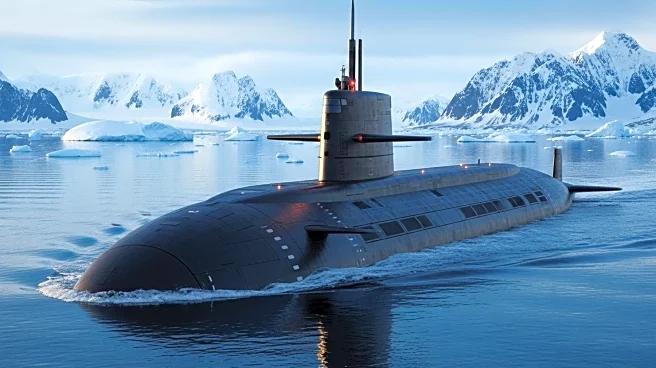What is the story about?
What's Happening?
Canada has chosen Germany's thyssenkrupp Marine Systems (tkMS) and South Korea's Hanwha Ocean Co Ltd as the qualified suppliers for its Canadian Patrol Submarine Project (CPSP). This decision is part of Canada's strategic defense initiative to bolster its naval presence in the Arctic, Atlantic, and Pacific oceans. The CPSP aims to deliver up to 12 new diesel-electric submarines to replace the current Victoria-class submarines. The selection process considered various designs, including submissions from Naval Group, Navantia, and Saab, but ultimately favored tkMS's Type 212 Common Design and Hanwha's KSS-III Batch 2. This move aligns with Canada's defense strategy document, 'Our North, Strong and Free,' which emphasizes the need for superior underwater surveillance capabilities to protect Arctic sovereignty.
Why It's Important?
The selection of tkMS and Hanwha for the CPSP is crucial for Canada's national security, particularly in the Arctic region. The Arctic is increasingly becoming a strategic area due to its natural resources and geopolitical significance. By enhancing its submarine capabilities, Canada aims to secure its extensive coastline and maintain operational readiness in the face of potential threats. This development is significant for U.S. interests as it underscores the importance of Arctic sovereignty and the need for allied cooperation in the region. The U.S. may benefit from strengthened security ties with Canada, ensuring stability and mutual defense in the Arctic.
What's Next?
The next steps involve the construction and delivery of the new submarine flotilla, which will enhance Canada's naval capabilities. The Royal Canadian Navy will focus on operational deployment across the three oceans, ensuring one submarine is available in each ocean at any given time. This strategic deployment will likely lead to increased collaboration with U.S. naval forces, particularly in joint exercises and surveillance operations in the Arctic. The U.S. may also monitor the progress of this program to assess its impact on regional security dynamics.
Beyond the Headlines
The decision to enhance submarine capabilities in the Arctic reflects broader geopolitical shifts, including increased interest from global powers in the region. This move may trigger discussions on international maritime law and Arctic governance, as countries seek to balance resource exploration with environmental protection. The ethical implications of military expansion in sensitive ecological zones could become a topic of debate among policymakers and environmental groups.

















